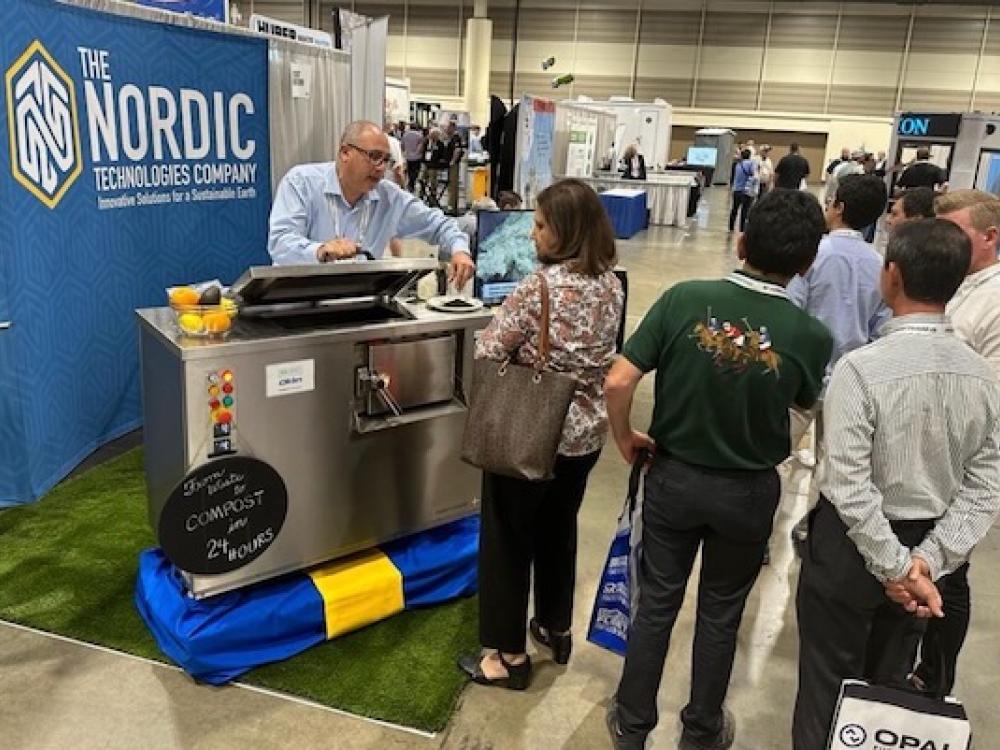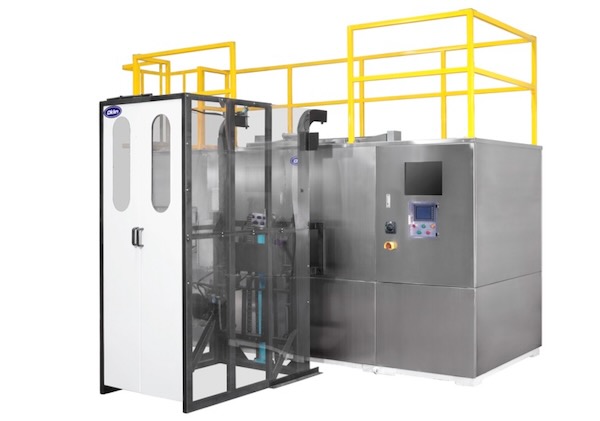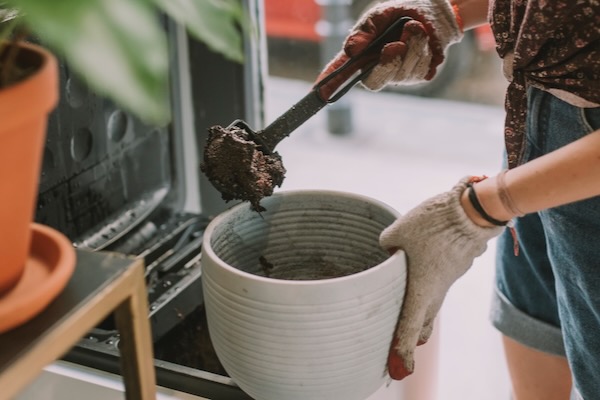
Mostafa Malki demos his company's composter designed for use in restaurants and hotels at a recent New Orleans expo. Photo courtesy of the Nordic Technologies Company.
June 15, 2023
As more cities aim for zero waste goals, many residents and businesses are looking for ways to keep food waste out of the landfill.
According to the EPA, a 2018 study reported that food waste comprises 24 percent of municipal landfill waste — the largest component.
A South Texas entrepreneur says his machines will not only make it easier for restaurants, food services and residents to reduce their overall waste, the equipment will quickly turn unused food into a valuable commodity.
Mostafa Malki, a professor of economics entrepreneurship at the University of Texas Rio Grande Valley, launched the Nordic Technologies Company at the beginning of the year with his Dallas-based partner Peter Johnsamson.
The company manufactures machines that can decompose food waste in less than 24 hours and turn it into nutrient-rich compost. The end product can then be used in gardening or farming applications.
THE SWEDISH CONNECTION
Malki, who has a PhD in applied economics, typically teaches students how to start businesses. Every year, he guides academic field trips to Sweden and other Nordic countries to give students a worldly perspective on business.
“I travel every year to Scandinavia. I take students with me to see the latest technology,” said Malki, who originally hails from Casablanca, Morocco.
Malki says he is connected to a network of entrepreneurs and researchers in the subregion of Northern Europe and finds their mindset is very different from their counterparts in the U.S.
“There’s a social responsibility component built into everything they do, even in their businesses,” said Malki.
As an example, Sweden was the first nation to implement carbon pricing. The Nordic country is also known for its efficient waste management system. Swedes recycle nearly half (47 percent) of their garbage. Around 52 percent of the country’s waste is burnt for heat. Only about 1 percent goes to the landfill.
It was in Sweden where he discovered state-of-the-art composting methods with the potential to process organic material in large quantites.
He saw a niche that was not being filled in the U.S. and eventually partnered with a manufacturer to bring it to the States.
SPEED COMPOSTING
 The Nordic Technologies Company's home model can process about 12 pounds in 24 hours. Courtesy of The Nordic Technologies.
The Nordic Technologies Company's home model can process about 12 pounds in 24 hours. Courtesy of The Nordic Technologies.
According to Cornell University, in the process of composting, microorganisms break down organic matter and produce humus, the relatively stable organic end product. Under optimal conditions, composting can take weeks or months to fully mature.
Malki says his company’s machine has sped up the process by combining the basics of composting with the latest advancements to turn organic material into nutrient-rich soil in less than 24 hours.
“The technology needs four things,” said Malki. “Air flow, heat, moisture. Bacterium is the secret ingredient.”
When you set up the Nordic machine, it comes with a bag of starter compost that contains the microbes, which are responsible for most of the organic material breakdown.
“You add it once you set up the machine, and then you never need to add microbes again,” he said. “They self-generate, like sourdough starter. You also don’t empty the machine completely, but if that happens by mistake, we send you another starter bag of compost.”
The Nordic machine ramps up the process by efficiently maintaining the ideal conditions. The material is heated up using a built-in system. The materials' temperature is raised to about 55 Celsius or 131 degrees Farenheit over a period of hours, which kills all pathogens.
A sensor tracks the mixture’s moisture content and prompts the user to add water as needed. The matter is also rotated. An air pump keeps the mixture aerated and also helps cool the motor. Hot air from the motor in turn, heats the compost.
“This makes the system really efficient and allows for the compost’s ideal temperature to be reached really quickly and it reduces the electrical consumption.”
After about 12 to 14 hours, the ingredients will be broken down but will still be moist, Malki said. After 24 hours, the material will be completed composted and have the consistency of coffee grounds.
APPLICATIONS
 The Nordic Technologies Company's 500 ton per year model is designed for larger industrial uses. Courtesy of The Nordic Technologies.
The Nordic Technologies Company's 500 ton per year model is designed for larger industrial uses. Courtesy of The Nordic Technologies.
The appliances can be used in businesses, restaurants, hospitals, schools and other organizations looking to reduce their carbon footprint and promote sustainability.
The company offers a residential-size model, smaller than a dishwasher — 18 inches wide and deep by 30 inches tall. The home model holds about 12 pounds of waste and can process two tons of organic waste per year.
Nordic’s focus has been on selling to businesses that generate larger volumes of food waste every day.
The next size up is being marketed to restaurants and hotels. The restaurant model holds 75 pounds and can process 10 tons per year.
From there, sizes go to 30 tons per year and all the way up to machines with a 600-ton capacity.
Malki says they can customize machines to fit a customer’s needs.
“You can scale up the size and add units once you go beyond a certain volume,” said Malki.
The larger models are capable of processing material for a landfill facility building, where a sorter could be added to the line.
Malki said the company is just getting started marketing the equipment. Several companies are showing interest.
A local business in McKinney with an onsite farm animal sanctuary is even testing one of Nordic’s products to see how well it composts manure.
"We sent our first batch of compost to be STA tested and it came back rated as 1-1-1 fertilizer, which is great," said Shannon McLinden, founder and CEO of FarmHouse Fresh. "The question for us is the expense and whether we can change our operations to accommodate the process. So we have some planning and decision making to do."
The machine is up to the task, confirms Malki.
“You can process anything that’s organic.”
COST AND BENEFITS
 Homeowner removes compost from the Nordic composting home machine. Courtesy of Nordic Technologies Company.
Homeowner removes compost from the Nordic composting home machine. Courtesy of Nordic Technologies Company.
As for cost, the home model is in the range of typical household appliances at $2,000.
The pricing goes up to $21,000 for the restaurant or hotel style model and $75,000 for the 100-ton machine.
Malki says the machines will eventually pay for themselves — the equipment is estimated to have a 30-year life span. Their benefits are both financial and environmental.
First, the composters can help businesses reduce their disposal fee costs.
Second, the machines create a viable commodity — nutrient rich soil, which can be sold to help offset the cost of the machinery or donated to local community gardens.
Third, the machines can help businesses meet city health codes by reducing the amount of food scraps lying around, which can attract pests.
And last, but most important from an environmental standpoint, the technology will help restaurants keep food waste out of the landfill and reduce greenhouse gas emissions produced by organic landfill waste.
This also helps meet evolving city guidelines.
The cities of Dallas and Fort Worth are both working towards long-term zero waste goals. In 2019, Fort Worth launched North Texas’s first municipal residential compost program, which is still a volunteer program.
But meanwhile, the city of Austin, which offers curbside compost collection to all residents, requires food-permitted businesses to keep their organic waste out of the landfill. These businesses are required to submit a plan that demonstrates their commitment to composting or donating food scraps to charity kitchens or to farms.
Malki said Austin’s ordinance reflects the future for other large municipalities.
“The trend is that recycling organic waste is going to go from being optional to being mandatory,” said Malki.
RELATED ARTICLES
North Texas businesses pick up slack on food composting
Fort Worth conductor turns zero waste pilot program into green business
Dallas Zoo animal waste to be recycled into retail compost
Dallas cafe's donated coffee grounds perk up nonprofit's compost
John Darling's award winning compost at UTA
Recycle Revolution adds curbside compost pickup for northeast Dallas residents
Stay up to date on everything green in North Texas, including the latest news and events! Sign up for the weekly Green Source DFW Newsletter! Follow us on Facebook and Twitter. Also check out our new podcast The Texas Green Report, available on your favorite podcast app.









